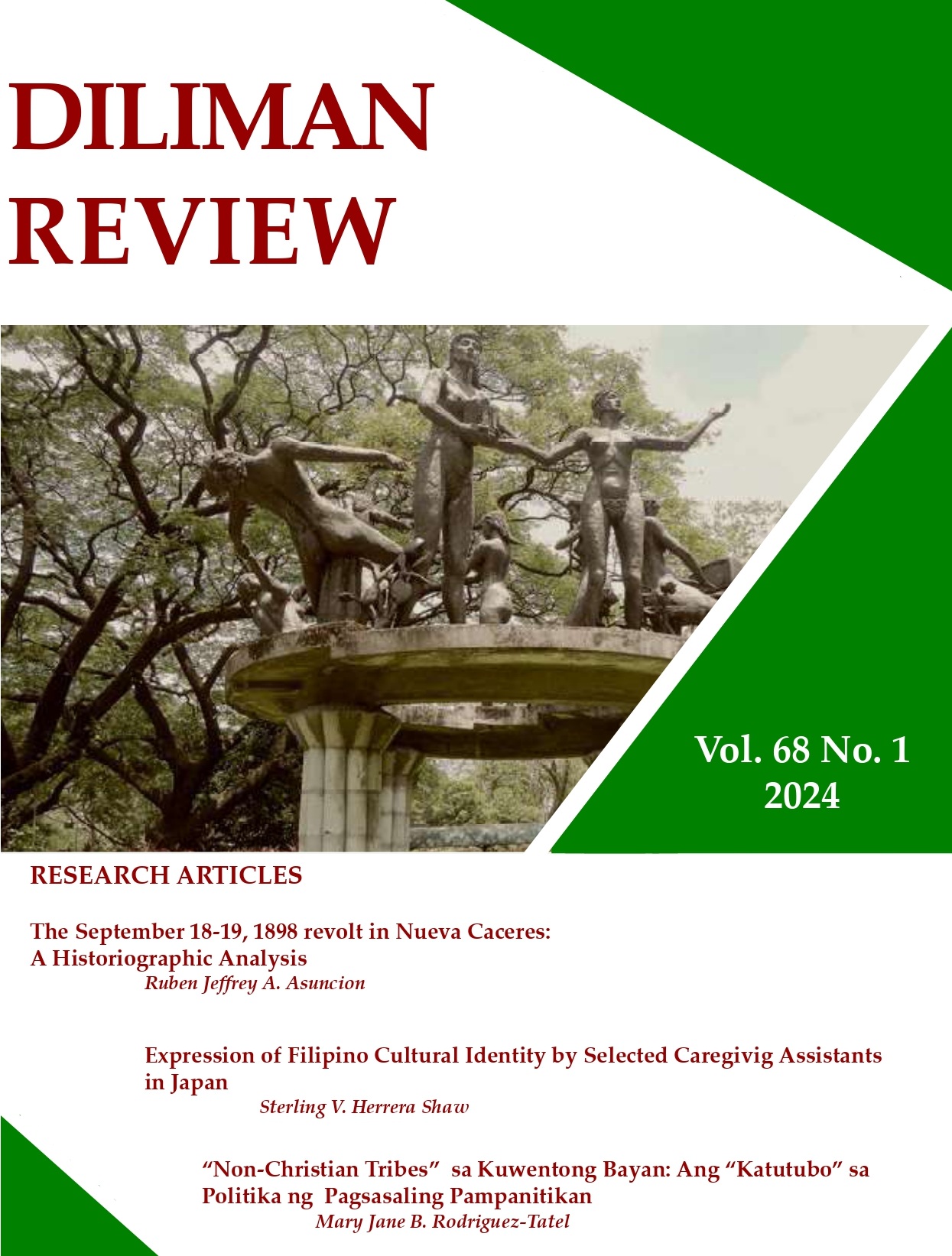“Non-Christian Tribes” sa Kuwentong Bayan: Ang “Katutubo” sa Politika ng Pagsasaling Pampanitikan
Abstract
Isang masalimuot na larang ng pagsasakapangyarihan ang pagsasaling pampanitikan. Hindi lamang ito usapin ng wika bagkus usapin din ng pagpapakahulugang hinuhulma ng ugnayan (tagisan at tagpuan) ng dalawang magkaibang kultura. Gamit ang mga pagdadalumat sa pagsasaling kultural (cultural translation), ipinopook ng pag-aaral na ito ang pagsasalin ng ilang piling kuwentong bayan sa konteksto ng mga katutubong Pilipino bilang “non-Christian tribes.” Sa katawagang ito, nagtatalaban ang mga usapin ng lahi, nasyon, at etnisidad na nilahukan ng tatlong aktor pangkasaysayan: una, ang mga Amerikanong kolonyalista; ikalawa, ang mga Pilipinong nasyonalista; at ikatlo, ang mga pinatutungkulang “tribu.” Lumikha ang talabang ito ng masalimuot na konteksto ng pagsasalin at pagpapakahulugan sa mga mito at alamat patungkol sa mga katutubo bilang “di-Kristiyanong tribu.” Kinasangkapan ang mga saling kolonyal sa “rasyalisasyon” o ideolohikal na proseso ng pagbubukod sa mga katutubong Pilipino. At nalikha ang “mito sa tribu” – ang naratibo ng “primitibismo” at “kabangisan” ng mga katutubo na humamon sa kampanya para sa independensiya noong panahong kolonyal, at patuloy na humahamon sa independiyenteng nasyong Pilipino matapos ang kolonyalismo. “Mito” itong isinalin, tinanggap at lumaganap sa kamalayan ng mayoryang Pilipino gaya ng masisipat sa reproduksiyon ng mga saling kolonyal sa hanay ng mga Pilipino iskolar. Subalit sa kabila ng mga teksto ng dominanteng diskurso mahalagang itampok ang tinig ng mga pinatutungkulan. Sa sariling bersiyon ng kanilang kuwentong bayan patuloy nilang binabawi ang saysay sa tinabunang salaysay.
(Literary translation implicates power. Drawing from the framework of cultural translation that posits the idea of translation as “transaction and negotiation between two different cultures,” this paper examines the production and reproduction of select folktales of the indigenous Filipinos as “non-Christian tribes.” Inscribed in this colonial term are overarching notions of “savagery and primitivism” which were operationalized in the intersecting discourses of race, nation, and ethnicity spanning colonial and post-colonial contexts: the empire-building of the Americans on the one hand and the nationalist project of the Filipino elite on the other hand. The interplay of these two competing (and at times, negotiating) agendas lays the predicate for translating and interpreting the creation myth (and closely related legend) of the indigenous peoples. In their attempt to integrate the latter in the main body politic, the colonial texts engendered a racialized discourse of the Non-Christian tribes as “exemplar of incomplete civilization” –serving as a major argument against Philippine independence during the first decade of American colonialism. And the myth of the “Non-Chistian tribes” was created and perpetuated even undermining the process of nation-building in the post-colonial era. The Filipino scholars, in the pursuit of developing an inclusive national literature, continued translating the folktales of the so-called underrepresented “minority.” As they engaged the colonial texts, they also reproduced the same racialized discourse, wittingly or unwittingly, silencing the voice of the “object of representation.” Nevertheless, as this “myth of the wild tribes” became widespread and reified in the public mind, it is imperative to give voice to Indigenous scholars who have already come up with their own versions devoid of racial stereotypes and biases. This is their meaningful way of reclaiming their stories vis-à-vis the grand narrative of the Filipino nation.)


